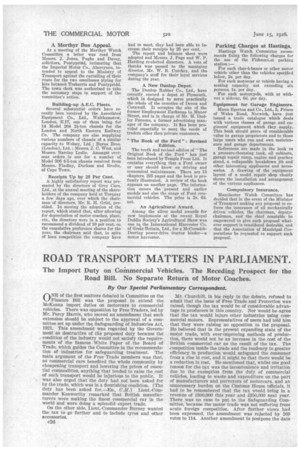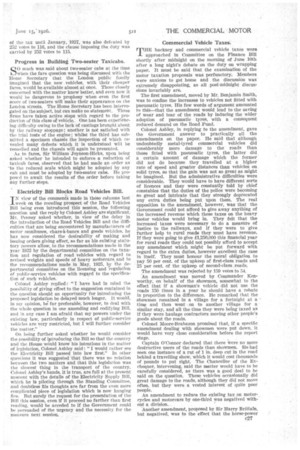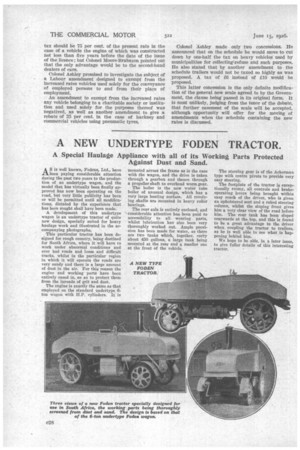ROAD TRANSPORT MATTERS IN PARLIAMENT.
Page 8

Page 9

Page 10

If you've noticed an error in this article please click here to report it so we can fix it.
The Import Duty on Coinmercial Vehicles. The Receding Prospect for the Road Bill. No Separate Return of Motor Coaches.
By Our Special Parliamentary Correspondent.
ONE of the first matters debated in Committee on the V./Finance Bill was the proposal to extend the McKenna import duties on motorcars to commercial vehicles. There was opposition by Free Traders, led by 311. Percy Harris, who moved an amendment that such extension should be subject to the approval of a committee set up under the Safeguarding of Industries Act, 1921. This amendment was regarded by the Government as destructive of the proposed duty because the condition of the industry would not satisfy the requirements of the famous White Paper of the Board of Trade, which guides the Committee in the recommendation of industries for safeguarding treatment. The main argument of the Free Trade members was that, as commercial cars benefited the whole community by cheapening transport and lowering the prices of essential commodities, anything that tended to raise the cost of such transport would be injurious to the public. It was also urged that the duty had not been asked for by the trade, which was in a flourishing condition. [The duty has been asked for.—ED., CAL] Lieut.-Commander Kenworthy remarked that British manufacturers were making the finest commercial car in the world and were doing a splendid export trade.
On the other side, Lieut.-Commander Burney wanted the tax to go farther and to include tyres and other accessories.
c26
Mr. Churchill, in his reply to the debate, refused to admit that the issue of Free Trade and Protection was raised, though the tax would be of considerable advantage to producers in this country. Nor would he agree that the tax would injure other industries using commercial motors. Representatives of users had told him that they were raising no opposition to the proposal. He believed that in the present expanding state of the motor trade, with ever-improving methods of production, there would not be an increase in the cost of the British commercial car as the result of the tax. The -competition inside the trade and the tendency to greater efficiency in production would safeguard the consumer from a rise in cost, and it might be that there would be a reduction in cost. He mentioned that, whilst one good reason for the tax was the inconvenience and irritation due to the exemption from the duty of commercial vehicles, leading to waste and expenditure on the part of manufacturers and purveyors of motorcars, and an unnecessary burden on the Customs House 'officials, it had to be remembered that the tax would bring in a revenue of 000,000 this year and £350,000 next year. There was no case to put to the Safeguarding Committee, because the motor trade was not suffering from acute foreign competition. After further views had been expressed, the amendment was rejected by 269 votes to 114. Another amendment to postpone the date of the .tax until January, 1927, was also defeated by 252 votes to 116, and the clause imposing the. duty was carried by 252 votes to 115.
Progress in Building Two-seater Taxicabs.
S0 much was said about two-seater cabs at the time when the fare question was being discussed with the Home Secretary that the London public fondly imagined that the new • vehicles, with their cheaper fares, would be available almost at once. Those closely concerned with the matter knew better, and even now it would be dangerous to prophesy when •even the first score of two-seaters will make their appearance on the London streets. The Home Secretary has been interrogated on the subject, but can make no statement. Three firms have taken active steps with regard to the production of this class of vehicle. One has been experiencing difficulty owing to the lack of castings brought about by i he railway stoppage; another is not satisfied with the trial tests of the engine ; whilst the third has submitted a specimen chassis the inspection, of which revealed many defectswhich it is understood wilt be remedied and the chassis will again be presented. As to fares, Sir William joynson-Hicks, upon being asked whether he intended to enforce a reduction of taxicab fares, observed that he had made an order as to the reduced scale which might be adopted by any cab and must be adopted by two-seater cabs. He proposed to await the results of the order before taking any further steps.
Electricity Bill Blocks Road Vehicles Bill.
IN view of the commentS made in these colunins last _ week on the receding prospect of the Road Vehicles. Bill being even introduced this session, the following question and the reply by Colonel Ashley are significant. Mr. Penney asked whether, in view of the delay in the introduction of the Road Vehicles Bill and the difficulties that are being encountered by manufacturers of motor omnibuses, chars-à-bancs and goods vehicles, he has now considered the desirability of making and issuing orders giving effect, so far as his exiting statutory powers allow, to the recommendations made in the year 1922 by the departmental committee on the taxation and regulation of road vehicles with regard to revised weights and speeds of heavy motorcars and to the recommendations made in May, 1925, by 'he departmental committee on the licensing and regulation Of public-service vehicles with regard to the specification of such vehicles.
Colonel Ashley replied : "T have had in mind the possibility of giving effect to the suggestion contained in the question should an opportunity for introducing the proposed legislation be delayed much longer. It would, in my opinion, be far preferable, however, to deal with the whole question in one amending and codifying Bill, and in any easel am afraid that my powers under the existing law, particularly in respect of public-service vehicles are very restricted, but I will further consider the matter."
On being further asked whether he would consider the possibility of introducing the Bill so that the country and the House would know his intentions in the matter of legislation, Colonel Ashley said : "I would rather see the Electricity Bill passed into law first." In other questions it was suggested that there was no relation between the two matters and that this legislation was the slowest thing in the transport of the country. Colonel Ashley's hands, it is true, are full at the present moment with the details of the Electricity Supply Bill, which he is piloting through the Standing Committee, and doubtless ffis thoughts are far from the even more complicated piece of legislation which is now hanging fire. But surely the request for the presentation of the Bill this session, even if it proceed no farther than first reading, would he acceded to if the Government could be persuaded of the urgency and the necessity for the measure next session.
Commercial Vehicle Taxes.
THE hackney and commercial vehicle taxes were approached in Committee on the Finance Bill shortly after midnight on the morning of June 10th after a long night's debate on the duty on wrapping paper. It must be said that the examination of the motor taxation proposals was perfunctory. Members were anxious to get home and the discussion was• extremely disappointing, as all post-midnight discus. sions invariably are.
The first amendment, moved by Mr. Benjamin Smith, was to confine the increases to vehicles not fitted with pneumatic tyres. His few words of argument amounted to this—that the amendment would lead to the saving of wear and tear of the roads by inducing the wider adoption of pneumatic tyres, with a consequent reduced demand on the Road Fund.
Colonel Ashley, in replying to the amendment, gave the Government answer to practically all the amendments on the paper. He said that although undoubtedly metal-tyred commercial vehicles did considerably more damage to the roads than those fitted with pneumatic tyres, the latter did a certain amount of damage which the former did not do because they travelled at a higher rate of speed and greater distances than vehicles on solid tyres, so that the gain was not so great as might be imagined. But the administrative difficulties were considerable. They would have to have different sorts of licences and they were constantly told by chief constables that the duties of the police were becoming so great and intricate that they strongly deprecated any extra duties, being put upon them. The real opposition to the amendment, however, was that the Government could pot afford to give away anything of the increased revenue which these taxes on the heavy motor vehicles would bring in. They felt that the increased taxes were necessary to do a measure of justice to the railways, and if they were to give further help to rural roads they must have revenue. If they were going to give £1,250,000 this financial year for rural roads they could not possibly afford to accept any amendment which might be put forward with regard to the extra duties, however excellent the case in itself. They must honour the moral obligation to pay 50 per cent, of the upkeep of first-class roads and 25 per cent. of the upkeep of second-class roads.
The amendment was rejected by 159 votes to 54.
'An amendment was moved by Commander Kenworthy, on behalf of the showmen, somewhat to the effect that if a showman's vehicle did not use the roads 150 times in a year he should have a rebate In proportion to the difference. He remarked that the showmen remained In a village for a fortnight at a time and then went on to another village for a similar stay, and all the time they were being taxed as if they were haulage contractors moving other people's goods about the roads.
Colonel Moore-Brabazon promised that, if a specific amendment dealing with showmen were put down, it would have very close consideration before the report stage.
Captain O'Connor declared that there were no more destructive users of the roads than showmen. He had seen one instance of a rut of 1 in. deep cut in the road behind a travelling show, which it would cost thousands of pounds to put right. The Chancellor of the Exchequer, intervening, said the matter would have to be carefully considered, as there was a good deal to be said on the question. These vehicles occasionally did great damage to the roads, although they did not move often, but they were a vested interest of quite poor people.
An amendment to reduce the existing tax on motorcycles and motorcars by one-third was negatived without a division.
Another amendment, proposed by Sir Harry Brittain, but negatived, was to the effect that the horse-power 027 tax should be 75 per cent. of the present rate in the case of a vehicle the engine of which was constructed not less than five years before the date of the issue of the licence; but Colonel Moore-Brabazon pointed out that the only advantage would be to the second-hand dealers of cars.
Colonel Ashley promised to investigate the subject of a Labour amendment designed to exempt from the Increased rates vehicles used solely for the conveyance of employed persons to and from their place of employment.
. An amendment to exempt from the increased rates any vehicle belonging to a charitable society or institution and used solely for the purposes thereof was negatived, as well as another amendment to give a rebate of 25 per cent. in the case of hackney and commercial vehicles using pneumatic tyres. Colonel Ashley made only two concessions. He announced that on the schedule he would move to cut down by one-half the tax on heavy vehicles used by municipalities for collecting\refuse and such purposes. He also stated that by another amendment to the schedule trailers would not be taxed so highly as was proposed. A. tax of 16 instead of £10 would be proposed.
This latter concession is the only definite modification of the general new scale agreed to by the Government, the clause being passed in its original form. It Is most unlikely, judging from the tenor of the debate, that further easement of the scale will be accepted, although opportunity will offer for the moving of amendments when the schedule containing the new rates is discussed.




















































